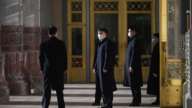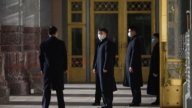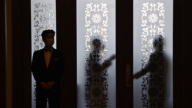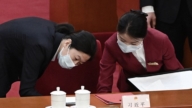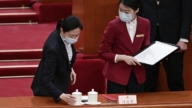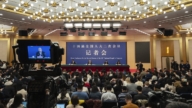【新唐人2012年3月9日訊】4號,中共副總理李克強出席中共政協無黨派和社科聯組會議,政協委員、蘇州大學憲法學教授楊海坤在會上作了5分鐘即席發言,闡述關於政治體制改革的想法,博得全場熱烈掌聲,但當局在報導中卻刪除了這一段。
當晚,《財經》雜誌副主編羅昌平在微博發貼子說,李克強出席了今天的政協分組會議,15位政協委員發言,楊海坤是最後一位,他即席舉手要求5分鐘發言,呼籲推進政改,建議中央能夠研究出臺有關政治體制改革的總體方案,博得熱烈掌聲。新聞聯播報導了這個會場,卻過濾了此段。羅昌平呼籲,應該讓楊海坤的聲音傳遞出來。
當晚楊海坤在接受媒體採訪時說:如果沒有政治體制改革,經濟體制的改革也不可能真正成功。他說,關於政治體制的改革他以前寫過提案,這次沒有。
廣州中國問題學者鞏勝利指出,中國談改革已談了30多年,但在中共一黨專制下等於是空談,再高的呼聲它也會馬上給你壓下去。
鞏勝利:「中國的改革啊,尤其在政治改革方面,幾乎是原地沒動,這個改革關係到幾個方面,一個是執政黨的權力,它的權力其本是認為不可動搖的,在這樣的框架下你改甚麼啊? 中國62年來到現在,從來沒有表示過老百姓的意見,它所謂的人大也好,黨代表也好,都是他指定的,你想想看,這樣的環境下它怎麼改革?」
5號,中共總理溫家寶在工作報告中近70次提到改革,他許諾要減緩經濟增長速度,對農民的土地權提供更好的保障。據香港報紙的統計,溫家寶的講話只贏得26次掌聲,創歷史新低。
鞏勝利:「溫家寶是提倡改革喊的最響的一個,就在前幾天他召開的國務院會議上,加速這個改革那個改革,他8年來都沒改革成,快走人啦,就是這個15號之後人大就要選舉了,那麼18號左右溫加寶就要走人了,他的改革還能改革成甚麼呢?」
兩會前夕,中國各地100多名公民聯名在網上向中共兩會政協、人大及十八大建言,要求建立官員財產申報制度。
這份建言書,再次呼籲國家領導人率先公布財產,以示自身清廉和反腐、反貪決心,建言書還特別呼籲習近平率先示範。當局沒有對此做出任何回應,但提出建言者卻被禁聲,眾多支持這項建言的簽名者也被當地公安警告。
維權律師唐荊陵:「這個我幾年前就做過了,這個國家腐敗這麼嚴重,這個『陽光法案』執行多年不能實現的情況下,我們不能老是等待,公民不能老是無謂的等待,必須行動起來。公民得把自己的意願,自己的看法說出來,像政治領導者公布他本人和他的直系親屬的財產狀況,這是防止腐敗的一個很重要的方法。」
前《新華社》記者高瑜指出,兩會就是一個權貴大會,它和民間的呼聲背道而馳。
高瑜:「你看現在這個代表大會上,不就是一個權貴大會嘛,有錢的和當官的,人大主要是當官的,政協主要是富起來的,…地位都很尊貴的,在共產黨的眼裡都是這種人,才能被它們請到去協商,所以在這個問題上和整個民間的,還有知識界的一些呼籲呢,他是背道而馳的。」
另外,今年兩會代表們五花八門的的雷人提案,比往屆推陳出新,如:賣淫合法化、18歲可以結婚、農村兒童不鼓勵上大學、港珠澳大橋塑建「和諧女神」、公民建道德檔案、禁止公款消費茅臺酒、窮人二胎指標轉贈富人等… 。
獨立參選人姚立法指出,兩會的召開,本是莊嚴大事,卻被這些代表們拿來愚弄社會,戲耍民眾,褻瀆人民賦予他們的權利,這樣的人做人大代表,真是中國的一大悲劇。
—————-
A “Two Meetings” talk on political reform presented by
Li Keqiang was ignored in official reports.
On March 4th, the CCP’s executive vice premier, Li Keqiang,
attended the meeting for non-partisan and
Social Sciences Association committees of
the Political Consultative Conference (PCC).
During the meeting, a Suzhou University professor of
constitutional law, Yang Haikun,
made an impromptu five minute lecture describing
his personal opinions on political reform.
Though his talk received warm applause,
it was not mentioned in the official report.
On the evening of March 4th, the vice chief editor of Finance
Magazine, Luo Changping, wrote on his Weibo microblog
that, in the PCC sectional meeting which Li Keqiang had
attended, fifteen committees spoke and Yang Haikun was
the last speaker; during his five minute impromptu talk,
he called for political reform and advised the authority
to draft a general outline for the reform based
on research work.
Though Yang’s words aroused warm applause, the CCTV
news reported the meeting without mentioning him.
Luo Changping remarked that Yang’s voice should be heard
by the public.
In an interview after the meeting, Yang Haikun said that
there will be no real success in economic reform without political reform.
He mentioned that he had submitted relevant proposals
before, but not this time.
A Guangzhou Scholar, Gong Shengli, pointed out that
discussions on political reform have continued for over 30
years in China, but they all turned out to be empty talk
under the CCP’s one-party dictatorship.
No matter how strongly the Chinese people demand reform,
the party has attempted to suppress all voices.
(Gong Shengli): “We have hardly seen any progress
in China’s reform, especially in politics. There are several aspects of this problem.
One is that such reform touches upon the ruling party’s
power, which the CCP protects at any cost.
How can you reform anything under such framework?
The CCP has never taken Chinese people’s will seriously
since it grabbed power 63 years ago.
The so-called representatives, in all Party organizations,
are assigned by the authority. Just imagine, could any reform happen in this case?”
On March 5th, the CCP’s premier, Wen Jiabao, delivered the
government work report in which he mentioned the word “reform” 70 times.
He also promised to slow down economic development
and provide better protection of peasants’ land usage rights.
According to a Hong Kong newspaper’s report, Wen’s talk
was applauded 26 times in total, reaching a historical low.
(Gong Shengli): “Wen Jiabao is probably
the loudest advocate for reform.
Just days ago, he still discussed reforms of ‘this and that’
in the State Council meetings.
He failed to reform during the past eight years and will step
out of office very soon.
We all know that the People’s Congress will run another round
of elections on March 15th and Wen will leave his job around the 18th.
It has been even more impossible for him to do anything.”
Before the “Two Meetings,” over 100 Chinese citizens made
a joint statement on the Internet to the People’s Congress,
the Political Consultative Conference and the 18th National
Congress.
They demanded the establishment of a reporting system
of officials’ properties.
The statement called for the national leaders to prove their
determination in anti-corruption by taking the lead to disclose their properties.
It specifically suggested that Xi Jinping be the first.
The authority didn’t officially respond to the statement,
nevertheless the admonishers were silenced.
Many supporters were also given warnings by local security
bureaus.
(Human rights laywer Tang Jingling): “I did something
similar several years ago.
As the corruption becomes worse and the ‘Sunshine laws’
have been unable to be carried out for years, we can’t wait any more.
The citizens can’t always wait forever. We have to take action,
and express our true wills and opinions.
The property disclosure of political leaders
and their relatives is a good way to stop corruption.”
The former Xinhua journalist, Gao Yu, remarked that
the “Two Meetings” is a meeting of power and wealth, which stands against the people’s wills.
(Gao Yu): “Have a look at the so-called ‘representative
meetings,’ you will find that these are for power and wealth.
The People’s Congress mainly benefits the high-rank officials
and the Political Consultative Conference is for wealth.
In the CCP’s opinion, they are ‘high-level’ people, otherwise
they wouldn’t be invited to join the ‘Consultation’.
In this sense, the representatives stand mostly against
ordinary civilians or intellectual advocates.”
Furthermore, this year’s “Two Meetings” proposals
are even more ridiculous than previous ones.
Such proposals include “Prostitution legislation”,
“Set marriage age to 18”,
“Not encouraging rural students to attend college”,
“Building a statue of Harmony at the
Hong Kong-Zhuhai-Macao Bridge”,
“Establish documents to record citizen’s moral history”,
“Forbid purchase of Maotai (liquor) with public funding”
and “permission for the poor to sell second-child to the rich.”
Independent candidate Yao Lifa remarked that, though
the “Two Meetings” should be solemn and important,
it has always been treated as a tool to fool the society
and dupe the people by the representatives.
Their disrespect towards Chinese people’s will and betrayal
to the role of people’s representatives is a huge tragedy for China and its people.
NTDTV reporters Bai Mei, Zhu Zhishan, Li Yun and Sun Ning



